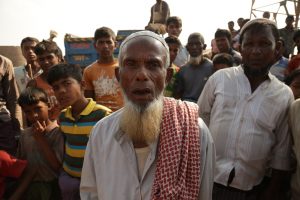Yesterday brought the sensational news that two Myanmar soldiers had been transferred to the custody of the International Criminal Court (ICC) after confessing to the murder of Rohingya Muslims during a crackdown in 2017.
The news was announced jointly by The New York Times, the Canadian Broadcasting Corporation, and the human rights watchdog Fortify Rights, which cited graphic statements that the men made during interviews filmed in Myanmar earlier this year.
In their testimony, Pvt. Myo Win Tun and Pvt. Zaw Naing Tun admitted to killing dozens of villagers in northern Rakhine State before burying them in mass graves. “We indiscriminately shot at everybody,” Myo Win Tun said in the video testimony, according to The New York Times. “We shot the Muslim men in the foreheads and kicked the bodies into the hole.”
In August 2017, Myanmar’s army responded to scattered attacks by Rohingya militants by torching villages and driving more than 700,000 desperate people over the border into Bangladesh, where more than a million now languish in refugee camps. Both soldiers confessed that their commanders told them to treat the northern regions of Rakhine State as a virtual free-fire zone. Zaw Naing Tun said he and his comrades received a chilling order from their superior officer: “Kill all you see, whether children or adults.”
In the first month of the military’s “clearance operation” in northern Rakhine, Doctors Without Borders estimated that at least 6,700 Rohingya, including 730 children, suffered violent deaths. The United Nations’ human rights chief later described the military’s actions as “acts of appalling barbarity” and possible “acts of genocide.”
After deserting from the Myanmar military, Myo Win Tun and Zaw Naing Tun ended up in the custody of the Arakan Army, an ethnic Rakhine militia currently fighting Myanmar’s military, or Tatmadaw, which videotaped their confessions. On September 7, both were reportedly transferred to the ICC at The Hague in the Netherlands, which is currently investigating the forced deportation of the Rohingya to Bangladesh. There the pair could face trial or testify in a case against others. Their confessions could also bolster the separate genocide case that is ongoing against Myanmar at the International Court of Justice (ICJ), also based in The Hague.
The testimony is the first time that members of the Tatmadaw have openly admitted to taking part in the vicious assault on the Rohingya. Matthew Smith, the chief executive officer of Fortify Rights, described their confessions as “a monumental moment for Rohingya and the people of Myanmar in their ongoing struggle for justice.”
Despite marking a significant step toward accountability, there is a long way to go before we see senior members of Myanmar’s military in the dock for genocide or crimes against humanity.
Sooner or later, any push for international legal accountability runs into the hard question of power: whether or not a court has the ability to pursue investigations or enforce rulings across sovereign borders. It is no coincidence that most of the ICC’s convictions have involved poor African nations whose sovereignty has been compromised by civil war or outside intervention.
Myanmar presents a thornier challenge. The country’s de facto leader Aung San Suu Kyi, once a liberal darling in the West, has been rightly assailed for her complicity in the persecution of the Rohingya. But she remains wildly popular in Myanmar’s ethnic Burman heartland, and is well poised to win another term in office at national elections on November 8.
When Aung San Suu Kyi traveled to the ICJ late last year to defend the Myanmar military against the charge of genocide, she was applauded and defended at home. Far from seeing them as victims, many ethnic Burmans view the Rohingya as illegal immigrants from Bangladesh, who they claim are slowly eroding Myanmar’s Burman Buddhist identity. (A similar view is held by many Buddhist Rakhines, even as they have also resisted the control of the Burman-dominated central state.)
Meanwhile, the country has a powerful ally in China which, seeking to advance its own strategic aims in Myanmar, has assured Aung San Suu Kyi’s government that it will shield it from any attempt to “internationalize” the Rakhine crisis.
All this sets up a challenging dilemma for advocates of international legal accountability. “If the popular response to Myanmar’s ICJ trial is any indication,” Geoff Aung, a Ph.D. Candidate in the Department of Anthropology at Columbia University, recently argued, “the pursuit of ‘international accountability’ stands to bolster, not weaken, the position of Myanmar’s military as nationalist subjects close ranks around a defense of national sovereignty.”
The shocking confessions of the two soldiers represents a small but significant step towards accountability for the atrocities committed in Rakhine State. At the very least, it will shed light on the heinous acts committed there. Whether it results in tangible improvements on the ground, however, remains an open question.

































